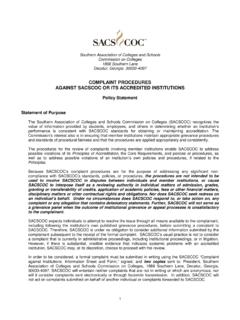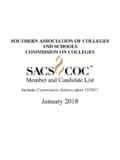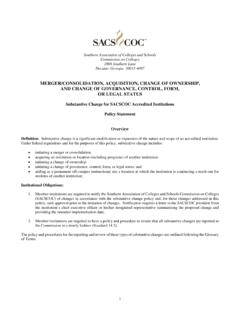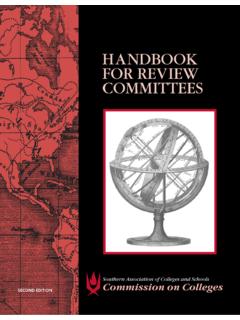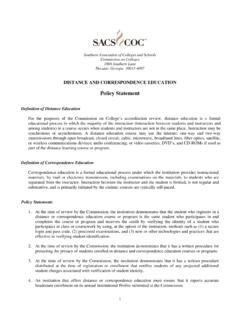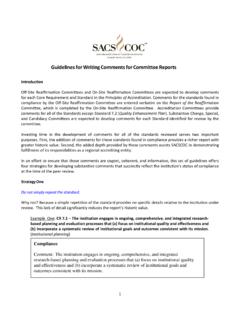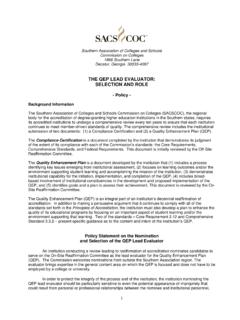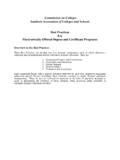Transcription of The Principles of Accreditation
1 The Principles ofAccreditation:Foundations for Quality EnhancementSouthern Association of Colleges and SchoolsCommission on Colleges1866 Southern LaneDecatur, Georgia 30033-4097404-679-4500404-679-4558 (Fax) by the College Delegate Assembly:December 2001 Revised by the College Delegate Assembly:December 2006, 2007, 2009, 2011 Fifth Edition Second PrintingCopyright 2012 by the Southern Association of Colleges and Schools Commission on CollegesCONTENTSnSACS COMMISSION ON of the Commission and the Process of Accreditation ..5n SECTION 1:The Principle of 2:Core 3:Comprehensive Institutional Governance and Institutional All Educational Programs.
2 28 Undergraduate Graduate and Post-Baccalaureate Professional Faculty .. Library and Other Learning Student Affairs and Financial Physical Substantive Change Procedures and Policy .. Compliance with Other Commission Representation of 4:Federal Requirements ..37nAPPENDIX:Commission Good 43 Commission Position The Southern Associationof Colleges and SchoolsCommission on Colleges1 MISSIONThe Southern Association of Colleges and Schools Commission on Collegesis the regional body for the Accreditation of degree-granting higher educationinstitutions in the Southern states.
3 The Commission s mission is the enhance-ment of educational quality throughout the region and the improvement ofthe effectiveness of institutions by ensuring that they meet standards estab-lished by the higher education community that address the needs of societyand students. It serves as the common denominator of shared values andpractices among the diverse institutions in Alabama, Florida, Georgia,Kentucky, Louisiana, Mississippi, North Carolina, South Carolina, Tennessee,Texas, Virginia, Latin America, and other international sites approved by theCommission on Colleges that award associate, baccalaureate, master s, or doc-toral degrees.
4 The Commission also accepts applications from other interna-tional institutions of higher by SACS Commission on Colleges signifies that the institution(1) has a mission appropriate to higher education, (2) has resources, programs,and services sufficient to accomplish and sustain that mission, and (3) main-tains clearly specified educational objectives that are consistent with its mis-sion and appropriate to the degrees it offers, and that indicate whether it issuccessful in achieving its stated through Accreditation embodies a traditional philosophythat a free people can and ought to govern themselves through a representa-tive, flexible, and responsive system.
5 Accordingly, Accreditation is best accom-plished through a voluntary association of educational institutions. Both a process and a product, Accreditation relies on integrity, thoughtful andprincipled judgment, rigorous application of requirements, and a context oftrust. The process provides an assessment of an institution s effectiveness inthe fulfillment of its mission, its compliance with the requirements of itsaccrediting association, and its continuing efforts to enhance the quality ofstudent learning and its programs and services. Based upon reasoned judg-ment, the process stimulates evaluation and improvement, while providing ameans of continuing accountability to constituents and the product of Accreditation is a public statement of an institution s contin-uing capacity to provide effective programs and services based on agreed-upon requirements.
6 The statement of an institution s Accreditation status withthe Commission on Colleges is also an affirmation of an institution s contin-uing commitment to the Commission s Principles and philosophy of accredi-tation. The Commission on Colleges expects institutions to dedicate themselves toenhancing the quality of their programs and services within the context oftheir resources and capacities and to create an environment in which teaching,public service, research, and learning occur, as appropriate to the the heart of the Commission s philosophy of Accreditation , the concept ofquality enhancement presumes each member institution to be engaged in anongoing program of improvement and be able to demonstrate how well it ful-fills its stated mission.
7 Although evaluation of an institution s educationalquality and its effectiveness in achieving its mission is a difficult task requir-ing careful analysis and professional judgment, an institution is expected todocument the quality and effectiveness of all its programs and services. The Commission on Colleges supports the right of an institution to pursueits established educational mission; the right of faculty members to teach,investigate, and publish freely; and the right of students to access opportuni-ties for learning and for the open exchange of ideas. However, the exercise ofthese rights should not interfere with the overriding obligation of an institu-tion to offer its students a sound education.
8 3 The Commission on Colleges adheres to the following fundamental characteristics of Accreditation : nParticipation in the Accreditation process is voluntary and is anearned and renewable institutions develop, amend, and approve process of Accreditation is representative, responsive, andappropriate to the types of institutions accredited. nAccreditation is a form of requires institutional commitment is based upon a peer review requires an institutional commitment to studentlearning and acknowledges an institution s prerogative toarticulate its mission, including a religious mission, within therecognized context of higher education and its responsibility toshow that it is accomplishing its requires institutional commitment to the conceptof quality enhancement through continuous assessment expects an institution to develop a balancedgoverning structure designed to promote institutional integrity,autonomy.
9 And flexibility of expects an institution to ensure that its programsare complemented by support structures and resources thatallow for the total growth and development of its OF THE COMMISSIONAND THE SOUTHERN ASSOCIATION OF COLLEGESAND SCHOOLSThe Southern Association of Colleges and Schools (SACS) is a private, non-profit, voluntary organization founded in 1895 in Atlanta, Georgia. TheAssociation is comprised of the Commission on Colleges, which accredits high-er education degree-granting institutions, and the Council on Accreditation andSchool Improvement, which accredits elementary, middle, and secondaryschools.
10 The Commission and Council, each separately incorporated, carry outtheir missions with autonomy; they develop their own standards and proceduresand govern themselves by a delegate College Delegate Assembly is comprised of one voting representative (thechief executive officer or the officer s designee) from each member institution. Itsresponsibilities include electing the seventy seven-member Board of Trustees ofthe SACS Commission on Colleges and guiding the organization s work, approv-ing all revisions in accrediting standards as recommended by the Board, approv-ing the dues of candidate and member institutions as recommended by the Board,electing an Appeals Committee to hear appeals of adverse Accreditation decisions,and electing representatives to the Association s Board of Trustees.

